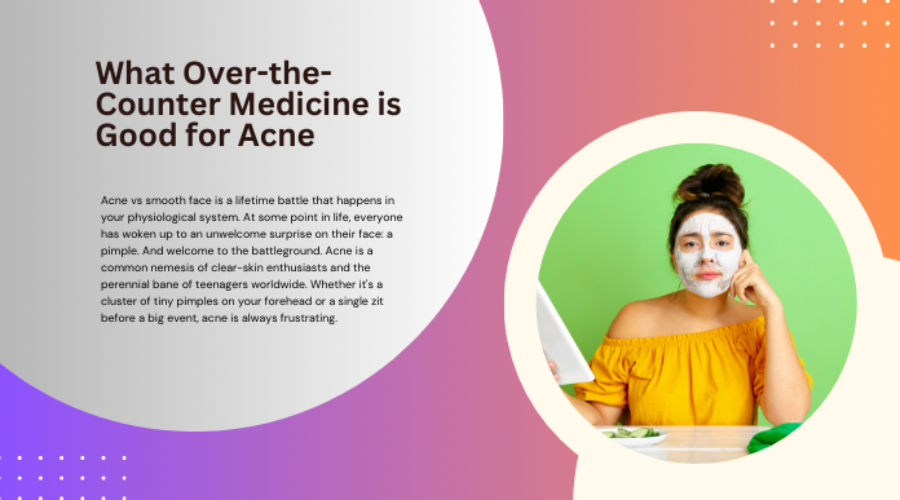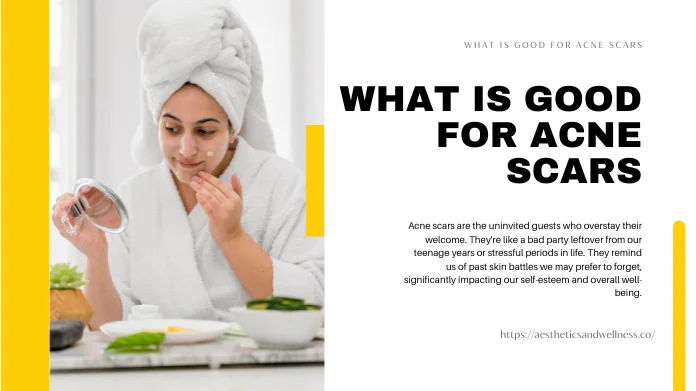What Over-the-Counter Medicine is Good for Acne
Acne vs smooth face is a lifetime battle that happens in your physiological system. At some point in life, everyone has woken up to an unwelcome surprise on their face: a pimple. And welcome to the battleground. Acne is a common nemesis of clear-skin enthusiasts and the perennial bane of teenagers worldwide. Whether it’s a cluster of tiny pimples on your forehead or a single zit before a big event, acne is always frustrating.
But the journey towards clearer skin doesn’t have to be complicated or expensive. Sometimes, the solution is just an aisle away in your favorite store. In this content, we will discover how over-the-counter medicines are your trusty weapons against acne.
What Over-the-Counter Medicine is Good for Acne
Acne isn’t just a teenage dilemma. It’s a skin challenge that affects millions of people across all ages. Luckily, the solution might just be a pharmacy trip away. Over-the-counter (OTC) medicines offer a first-line defense against the army of blemishes that can march across your skin. Let’s explore the what, how, and why of OTC acne treatments to help you find your skincare stride.
How Over-the-Counter Acne Treatments Work
Understanding the enemy is half the battle won. OTC acne treatments work by targeting the factors that contribute to acne breakouts. Excess oil, clogged pores, bacteria, and inflammation are commonly responsible for acne. OTC typically contains active ingredients such as benzoyl peroxide, salicylic acid, or sulfur, which help to reduce bacteria, unclog pores and decrease oil production in the skin. These ingredients work together to address different aspects of acne, promoting clearer and healthier skin over time.
Key Ingredients in Over-the-Counter Medicine for Acne
Benzoyl Peroxide
Benzoyl peroxide is used to treat acne by targeting multiple factors. It has antibacterial properties that kill acne-causing bacteria, helps exfoliate the skin to unclog pores, reduces excess sebum production, and provides mild anti-inflammatory effects. When used alongside antibiotics, it prevents antibiotic resistance. However, it can cause dryness and irritation in some individuals. Therefore, following usage instructions and considering lower strengths for sensitive skin is essential.
Retinoids

Retinoids, derived from vitamin A, serve various functions in acne treatment. They work by encouraging cell turnover and preventing the formation of new blemishes. This prevents new acne lesions and treats non-inflammatory acne like blackheads and whiteheads. Retinoids can also enhance the effectiveness of other acne treatments but may cause skin irritation. For this reason, they need to be used carefully and with sun protection.
Salicylic Acid
Salicylic acid is a go-to ingredient in many OTC acne products. It is a crucial component of acne treatment, offering versatile functions. As a beta hydroxy acid, it exfoliates within pores, preventing blackheads and whiteheads. Its mild anti-inflammatory properties reduce redness and swelling in acne lesions, particularly inflammatory ones. Salicylic acid also regulates sebum production, addressing the root cause of excess oil in acne-prone skin. It treats existing acne, accelerates healing, and improves blemishes’ appearance.
Azelaic Acid
Azelaic acid is another versatile acne-fighting ingredient that offers a multi-pronged approach. It exhibits antimicrobial properties while reducing inflammation associated with acne. Moreover, Azelaic acid also aids people who are prone to post-inflammatory hyperpigmentation (PIH) by controlling excessive skin cell production. Although it is safe for pregnant women with hormonal acne, the first application may produce some moderate itching or burning.
Alpha Hydroxy Acid (AHA)
Alpha hydroxy acids, such as glycolic and lactic acid, can be found in some OTC acne products. AHAs gently exfoliate the surface of your skin, helping to remove dead skin cells. It helps unclog pores and prevent blackheads and whiteheads. This not only improves skin texture but also reduces the appearance of acne scars over time. Additionally, they can improve the absorption and effectiveness of other acne treatments when used together. Overuse of AHAs can cause dryness and make the skin more sensitive to sunlight.
Sulfur
Sulfur has been used for generations to address various skin conditions. It is employed in acne treatment for its distinctive functions. Sulfur has mild keratolytic properties, aiding in removing dead skin cells and unclogging pores. Additionally, sulfur has antibacterial properties, helping to reduce the presence of acne-causing bacteria. Sulfur-based products, such as creams and masks, are often used to spot-treat individual acne blemishes. However, the distinct odor of sulfur may be off-putting for some users.
Topical Antibiotics
Certain OTC acne treatments contain topical antibiotics like clindamycin or erythromycin. They are integral to acne treatment with clear functions. These antibiotics kill the bacteria (Propionibacterium acnes) that contribute to acne formation. By reducing the bacteria on the skin’s surface, they help minimize inflammation and prevent new acne lesions from developing. Topical antibiotics are often used with other acne treatments, such as benzoyl peroxide, to enhance their effectiveness. However, use them as advised by a doctor to avoid antibiotic resistance, which makes bacteria less sensitive to treatment.
Dapsone
Dapsone is another ingredient found in specific OTC acne treatments. It is particularly effective in treating inflammatory acne, like deep, painful nodules and cysts. Dapsone has antibacterial properties that help to control the growth of bacteria on the skin’s surface and prevent new acne lesions. It comes in topical gel and cream and is often combined with other acne medications to improve overall treatment results. However, some individuals may experience skin dryness or irritation when using products containing dapsone.
Birth Control Pills
For individuals with hormonal acne, birth control pills or oral contraceptives can offer relief through hormonal regulation. They can help regulate hormones, particularly in women, by reducing androgen (male hormones) levels in the body. Lower androgen levels can lead to less oil production in the skin, which is beneficial in preventing acne. Birth control pills can be prescribed as a part of acne management, especially when acne is related to hormonal fluctuations, like premenstrual flare-ups or conditions like polycystic ovarian syndrome (PCOS). It’s essential to consult with a doctor about birth control pill side effects and risks before using them to treat acne.
Isotretinoin
Isotretinoin is a potent acne-fighting medication available by prescription. It significantly reduces the size and activity of the skin’s oil glands, which helps decrease excess oil production. This reduction in oil helps prevent clogged pores and severe acne breakouts. Additionally, isotretinoin promotes the shedding of dead skin cells. It’s typically prescribed for severe or persistent cases of acne when other treatments have been ineffective. Due to potential adverse effects and safety issues, its use requires physician supervision.
Spironolactone
Spironolactone is another prescription medication used to treat hormonal acne. It is an anti-androgen that reduces hormone effects on the skin, especially acne caused by hormonal fluctuations. By blocking these hormones, spironolactone can help control the overproduction of oil, preventing acne breakouts. Regular monitoring is necessary when using spironolactone due to its potential impact on electrolyte balance.
Benefits of Using Over-the-Counter Medicine for Acne
Easy access: OTC acne products are available without prescription in stores and online.
Affordable: Cost-effective compared to prescription options, making them budget-friendly.
Variety: Various OTC products cater to different skin types and preferences.
Self-treatment: Empowers individuals to manage acne independently.
Early use: Suitable for addressing minor breakouts and preventing worsening.
Clearer skin: Reduces blemishes, redness, and inflammation, leading to a better complexion.
Privacy: Discreet solution without the need for discussions with healthcare professionals.
Non-prescription: No need for a doctor’s visit or prescription, saving time and resources.
Quick action: Early use can lead to visible improvements, offering rapid relief from acne-related concerns.
Potential Side Effects of Over-the-Counter Acne Medications
Using over-the-counter (OTC) acne medications can have potential side effects, although they are generally mild and temporary. It’s crucial to be aware of these potential side effects when using OTC products:
Skin irritation: Some OTC acne treatments, like benzoyl peroxide and salicylic acid, may cause skin dryness, redness, or peeling. It’s essential to start with a lower-strength product if you have sensitive skin and to follow usage instructions.
Allergic reactions: While rare, some individuals may be allergic to certain OTC acne products, resulting in itching, rash, or swelling. Discontinue use if this occurs and seek medical advice.
Photosensitivity: Some acne medications can make the skin more sensitive to sunlight. It’s advisable to apply sunscreen when using these products to prevent sunburn.
Over-drying: Excessive use or higher concentrations of acne treatments can lead to over-drying of the skin, causing discomfort and potentially worsening acne.
Increased sensitivity: Certain OTC products may make the skin more sensitive, making it essential to avoid abrasive scrubs or harsh cleansers when using them.
Stinging or burning: You may experience mild stinging or burning upon application of some acne treatments. This is usually temporary and should subside.
Contact dermatitis: Prolonged use of OTC acne medications can lead to contact dermatitis, a skin condition characterized by redness, itching, and irritation.
Conclusion
Over-the-counter (OTC) medicines are an effective and accessible option for managing mild to moderate acne. They offer a variety of choices, including cleansers, creams, gels, and spot treatments. These options allow individuals to tailor their skincare routine to their specific needs. OTC products can relieve acne-related concerns, such as clogged pores and blemishes, making them a valuable tool for many. However, it is advisable to consult a healthcare provider or dermatologist for severe or persistent cases to explore prescription treatments.



